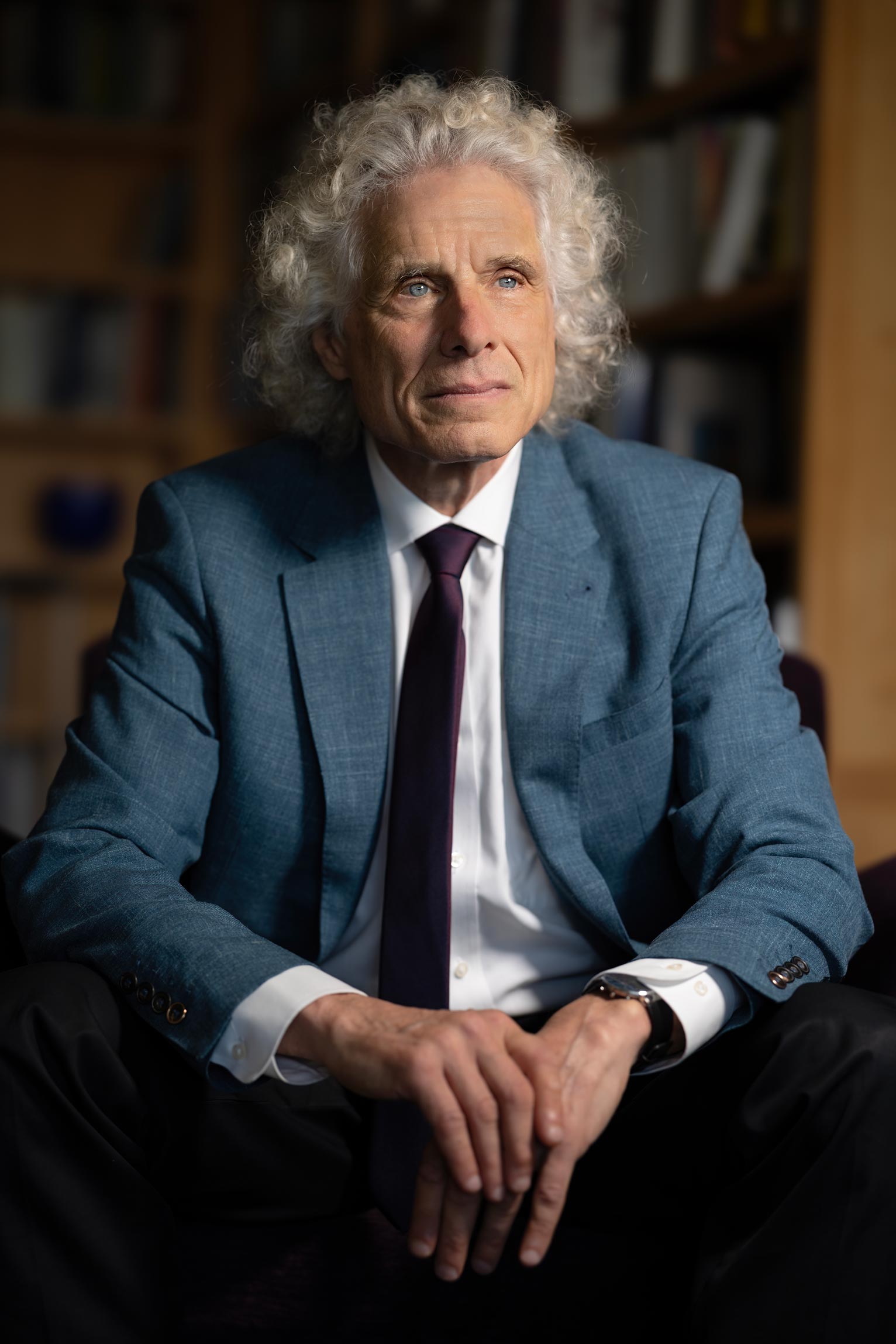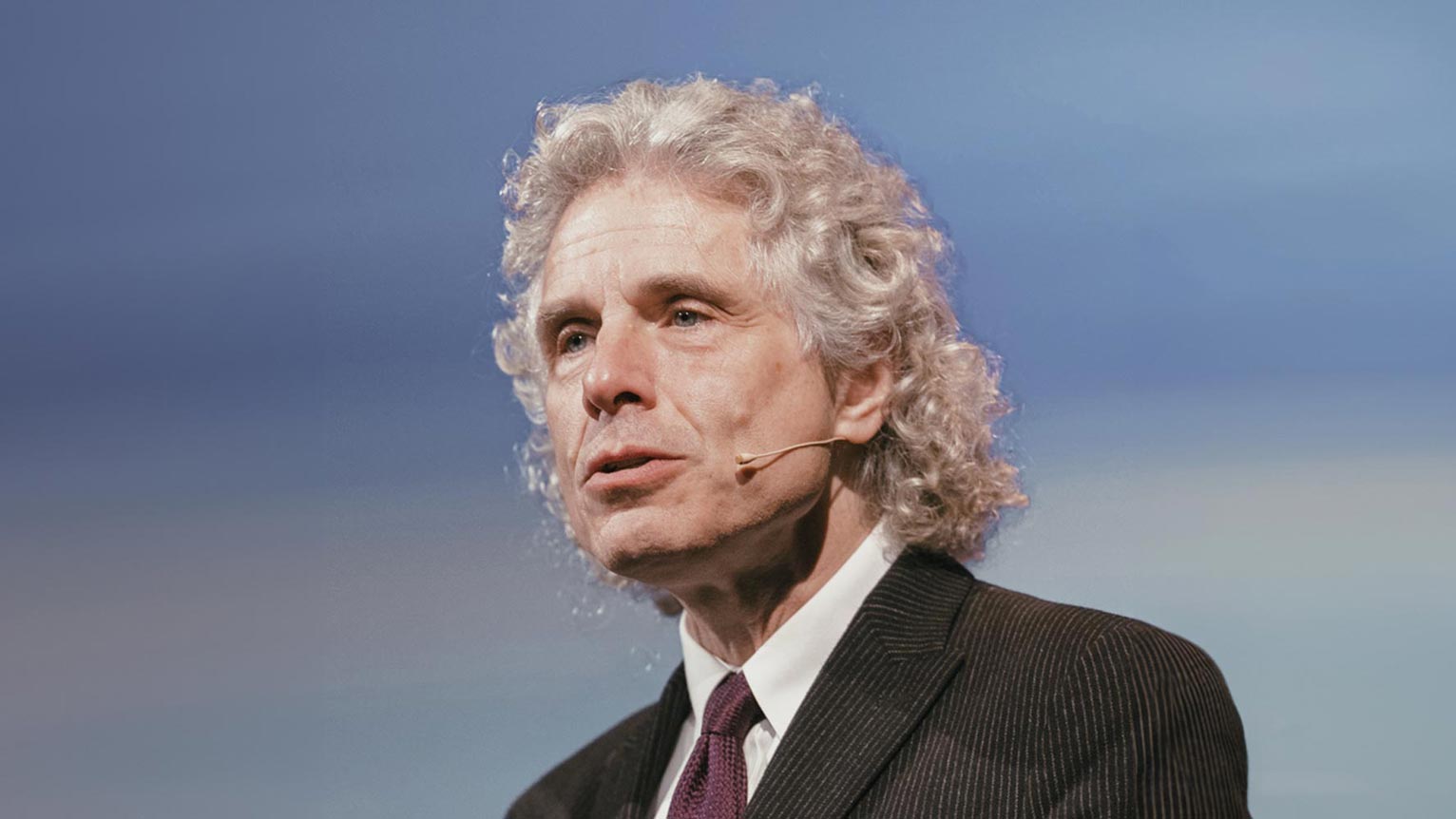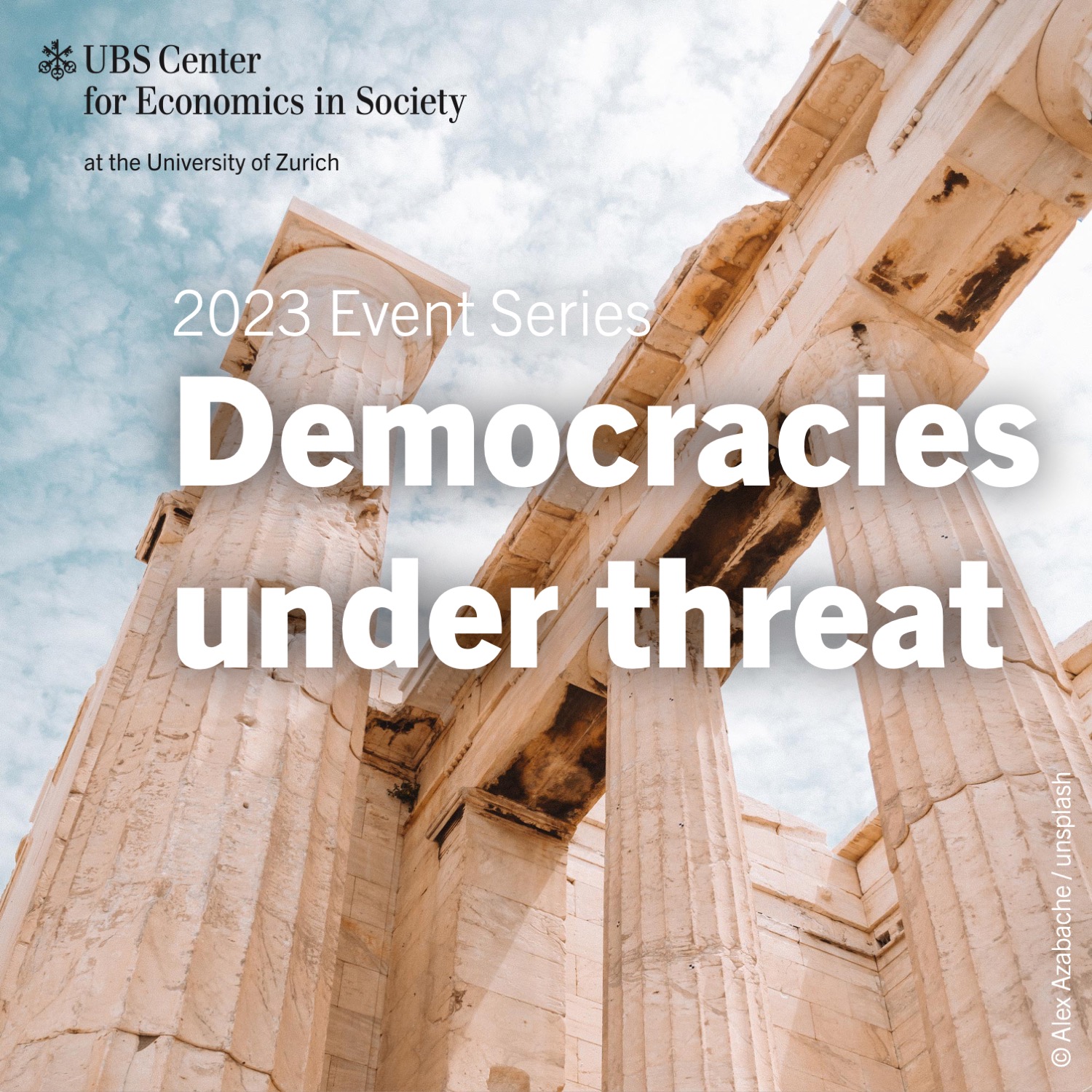Steven Pinker interview
The renowned professor Steven Pinker is an unshakeable believer in human progress and reason. How does he respond to widespread pessimism?
This interview by Albert Steck was originally published in German in Swiss weekly NZZ am Sonntag on 28.10.2023. Translated and edited for layout purposes by the UBS Center.
Mr. Pinker, do you agree that the world is going through particularly hard and difficult times at the moment?
Yes, but with the qualification that we’re actually always living in hard and difficult times. Because you can basically pick out any period, and you’ll always find that people had reason to be concerned about the state of the world.
However, we would have hardly thought until recently that the military attacks on Ukraine or Israel were possible.
These wars are terrible, and indeed, they have recently been increasing in number. Taking the number of war deaths relative to the world’s population, we are now at the highest level since the late 1980’s. But the numbers were much higher in the decade before that. The long-term trend of declining violence thus remains intact – despite the recent setback.
In your books like Enlightenment Now, you argue that people have made steady progress thanks to their ability to think rationally. Are you an unshakeable optimist?
Personally, I have little don’t think of myself as an “optimist.” I’m more concerned with rationality and facts. Indeed, the data show that impressive progress has been made in many areas: people live longer, and are healthier, better educated, and benefit from more leisure time.
But polls show that many people have lost faith in a better future. Seven out of ten people in the US or Germany think the next generation will be worse off economically. How do you explain the widespread pessimism?
I see a major factor in the media. It’s characterized by a negativity bias, which means that the media gets more attention with negative news. If something goes wrong, it’s more of a headline. An explosion, for example, happens abruptly. By contrast, most of the improvements are incremental: if illiteracy drops by a few percentage points a year, people hardly notice it.
However, a measurable deterioration can be seen in the decline in life expectancy in the US. This applies primarily to people with low levels of education.
It is no coincidence that the United States of all countries is affected. In many respects, the country is a special case among democracies. In addition to falling life expectancy, we also have higher crime rates, more drug addicts and more suicides than, for example, Switzerland. That is why we need a debate on what we can learn from other democracies in order to be better placed in terms of these criteria.
It is not only in the US, however, that people’s trust in democratic institutions is waning.
Our democracies are undoubtedly facing a challenge. This, too, has to do with the perception of current crises. Younger people in particular tend to think that today’s situation is as bad as it has ever been, ignoring the fact that we experienced a severe energy crisis with recessions and high inflation in the 1970’s, for example. This does not mean that we should belittle today’s problems. But comparing them with past crises helps us improve democracy and market regulation even in difficult times.
The political fronts, however, have hardened enormously: when Donald Trump calls the election “fraudulent,” he receives applause.
Our worldview is strongly influenced by our membership in a social group. As I say in my book More Rationality, it’s hard to fight this tribalism. In order to support their own tribe, many people are willing to spread fake news.
So people don’t function very rationally, do they?
There’s an interesting contradiction here. People tend to be very sensible when it comes to making decisions in their day-to-day lives. Artificial intelligence also cannot keep up with humans here. Nobody would trust their baby to a robot. But people find it much harder to take a rational approach when it comes to societal, national, or even global issues.
Your research shows that humans are innate not only in language, but also in logical thinking. But the question is: Are we effectively using these skills to our advantage?
It’s an intriguing question, because human nature is extremely complex: we have a tendency to domination, to sadism, and to revenge, as well as to empathy, to altruism, and to self-control. So what does this mean for social progress? I think there’s little point in philosophizing about human nature. Rather, my approach is to answer this question empirically by analyzing the data. Based on the progress we’ve measured, we can deduce which factors have contributed to it.
In your view, economic and scientific progress also leads to moral improvements. Do recent developments in China not prove otherwise?
No. It is true that China has enjoyed a spectacular upswing since Mao’s reign, yet per capita economic output is only about a quarter of that of Western countries. We do not know whether the country will ever be able to match our standards. It is also open to question whether this would lead to a liberalization of society. However, there is a correlation between a country’s prosperity and a society’s values of freedom.
Are you disappointed that the concept of “change through trade” – where economic integration leads to social opening – is not more effective?
Doux commerce, after all, originated in the Age of Enlightenment around 1700. It does not mean that trade automatically makes the world more liberal and peaceful. Rather, it means that people value their wealth so much that they cooperate more. But a political leader or a country may decide to sacrifice that wealth for another purpose. China will not invade Taiwan if it places its highest priority on economic growth. People’s desire for wealth can thus prevent money from being spent on wars.
Which of the current crises do you consider to be particularly threatening from the point of view of the Enlightenment?
Climate change is certainly a major challenge. I also see the rise of authoritarian, nationalist politics as a threat to our liberal democracies. What is important to me, however, is that the media’s view of current events consists of an enumeration of the various current crises. This could lead to the incorrect conclusion that the world as a whole is in crisis and that the situation has changed for the worse. However, we should not confuse this with the state of affairs that emerges from the analysis of data, for example on the development of poverty.
What drives you to focus on the positive facts, even in today’s dark and difficult times?
Behind this is my awareness of human history, which has experienced much darker chapters. Add to this my focus on data from all sorts of areas, be it poverty, health, or violence. Of course, I worry about the setbacks caused by war or authoritarian movements. Yet the number of democracies around the world is only slightly below its peak.
Your own family history can also impressively illustrate the progress achieved.
My own grandfather, who grew up in Poland, had eight siblings, four of whom died in childhood. In World War I, he was imprisoned and subject to forced labor in a coal mine. Later, in the Great Depression, he lost his job. My grandmother’s first childhood memory came during the Jewish pogroms in the Russian Empire. My father’s cousin was deported with his family to Siberia during World War II, and his family was lucky, because they survived the war. Together with a wealth of statistics, these examples illustrate that today’s situation may seem unpleasant, but there have been much worse times.
The renowned professor Steven Pinker is an unshakeable believer in human progress and reason. How does he respond to widespread pessimism?
This interview by Albert Steck was originally published in German in Swiss weekly NZZ am Sonntag on 28.10.2023. Translated and edited for layout purposes by the UBS Center.
Mr. Pinker, do you agree that the world is going through particularly hard and difficult times at the moment?


Preaching progress tirelessly
The 69-year-old psychologist Steven Pinker is a staunch supporter of the Enlightenment and of humanism. His research has focused on the innate development of language and rational thinking in people. Many of his books, such as Enlightenment Now, Rationality, and How the mind works, have become bestsellers. Born in Canada, the 69-year-old is a professor at Harvard University. Time Magazine named him one of the 100 most influential scholars and thinkers in 2004. On 7 November, Pinker will be in Switzerland for a public lecture. At the invitation of the UBS Center for Economics in Society, he will give a lecture on rationality in the main building of the University of Zurich. (AS)
The 69-year-old psychologist Steven Pinker is a staunch supporter of the Enlightenment and of humanism. His research has focused on the innate development of language and rational thinking in people. Many of his books, such as Enlightenment Now, Rationality, and How the mind works, have become bestsellers. Born in Canada, the 69-year-old is a professor at Harvard University. Time Magazine named him one of the 100 most influential scholars and thinkers in 2004. On 7 November, Pinker will be in Switzerland for a public lecture. At the invitation of the UBS Center for Economics in Society, he will give a lecture on rationality in the main building of the University of Zurich. (AS)

Quotes
Livestream
Event series
Democracies around the globe are increasingly under threat. In many countries, populists are gaining ground, polarization is increasing, and voters often fail to vote. Public intellectuals are debating the prospects for post-democratic politics. At the same time, authoritarian regimes are seeing a resurgence. What is driving these trends? And what can be done to reverse them? This is the main topic of our series, which consisted of three events, beginning with a lecture by Wolfgang Schäuble (in German), who provided a political-historical framework of the topic, followed by a talk by experimental psychologist Steven Pinker, who discussed the role of rationality for democratic societies. We concluded with our annual Forum for Economic Dialogue, where experts from various fields discussed the topic from both a political and an economic perspective.
Democracies around the globe are increasingly under threat. In many countries, populists are gaining ground, polarization is increasing, and voters often fail to vote. Public intellectuals are debating the prospects for post-democratic politics. At the same time, authoritarian regimes are seeing a resurgence. What is driving these trends? And what can be done to reverse them? This is the main topic of our series, which consisted of three events, beginning with a lecture by Wolfgang Schäuble (in German), who provided a political-historical framework of the topic, followed by a talk by experimental psychologist Steven Pinker, who discussed the role of rationality for democratic societies. We concluded with our annual Forum for Economic Dialogue, where experts from various fields discussed the topic from both a political and an economic perspective.
